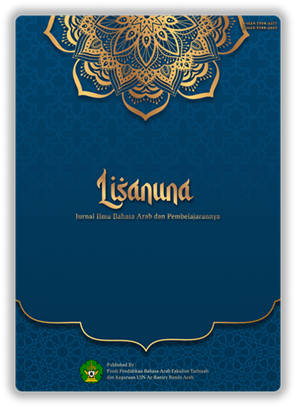تأثير نموذج التعليم التعاوني بنوع جيكساو في فهم النصوص العربية الطلاب في مدرسة الزمرية المتوسطة القرآنية الإسلامية الداخلية سيمالانجانج
DOI:
https://doi.org/10.22373/ls.v12i2.16378Keywords:
Arabic learning, Jigsaw cooperative learning model and understanding Arabic text.Abstract
Learning model is one of the methods used by teachers to improve learning activities, especially in learning Arabic. Based on the initial observations, the researchers saw that in learning activities student had difficulty understanding Arabic texts, students’ enthusiasm for learning was reduced, student were not active in learning and teachers still used tradisional learning models. Therefore, researchers are interested in trying to use a learning model that is suitable for use in this study. One of them is the Jigsaw tipe cooperative learning model. Jigsaw type of cooperative learning model is a learning model that requires active students, eager to learn in small groups. The purpose of this study is to determine whether there is an effect or not using the Jigsaw type cooperative learning model on students’ understanding of Arabic texts. In this study, the researcher used a true experimental design with the post test only control group design. While the tools to collect data used by researchers are observation, interviews and post test exams. This research data is a quantitative descriptive research. As for the population and samples in this study, all 7th grade students of SMPQ al-Zamriyah Islamic Boarding School Simalanggang. Which consists of 2 classes, namely class A and class B. The total number of students is 40 peoples. The results of this study show that data analysis using the t-table test at the level of 5% (0,05) t-count > t-table, which is 5,873 > 2,024. So, the conclusion in this study is that the Jigsaw type of cooperative learning model has an effect on understanding Arabic texts for 7th grade students at SMPQ al-Zamriyah Islamic Boarding School.
Downloads
References
أحمد, طعيمة، رشدي. تعليم العربية لغير الناطقين بها, 1989
االسعادية،حريات. “تحليل محتوى كتاب دروس اللغة العربية الجزء الأول للإمام الزركشى والإمام الشباني من حيث التراكيب وأثرها في فهم النصوص الغسلامية” 02, no. 01 (2018).
ريزال،إيكا. “استخدام طريقة التمييز لتعليم القواعد النحوية ةأثره في تحصيل الطلبة (بحث تجريبي في معهد بيت التمييز بإندرامايو، جاوى غربية).” الرسالة الماجستير في قسم تعليم اللغة العربية بجامعة مولانا مالك إبراهيم الإسلامية الحكومية بمالانج, 2013, 20.
فبرانتا, ريتا. “فعّالية استخدام النيئة المدرسية في ترقية مهارة الكلام (بحث تجريبي في المدرسة الثانوية الحكومية سوريا بوانا مالانج–جاوي الشرقية),” 2009.
ب. المراجع الإندونيسية
Arikunto. Manajemen Penelitian. Jakarta: Rineka Cipta, 2019.
Hayati, Sri. BELAJAR & PEMBELAJARAN BERBASIS COOPERATIF LEARNING. Magelang: GRAHA CENDEKIA, 2017.
Hermawan, Acep. Metodologi Pembelajaran Bahasa Arab. Bandung: PT Remaja Rosdakarya, 2011.
Huda, Miftahul. Model-Model Pengajaran dan Pembelajaran. Yogyakarta: Pustaka Belajar, 2013.
Istarani. Model Pembelajaran Inovatif. Medan: Media Persada, 2012.
Mulyono, Abdurrahman. Pendidikan bagi Anak Berkesulitan Belajar. Jakarta: Rineka Cipta, 1999.
Nurhasanah dan Didik, Tumianta. Kamus Besar Bergambar Bahasa Indonesia untuk SD dan SMP. Jakarta: Bina Sarana Pustaka, 2007.
Rianingsih, Dewi, Mawardi Mawardi, dan Krisma Widi Wardani. “Penerapan Model Pembelajaran Tps (Think Pair Share) Dalam Rangka Meningkatkan Keterampilan Komunikasi Siswa Kelas 3.” NATURALISTIC : Jurnal Kajian Penelitian Pendidikan dan Pembelajaran 3, no. 2 (2019): 339–46. https://doi.org/10.35568/naturalistic.v3i2.394.
Riyanto, Yatim. PARADIGMA BARU PEMBELAJARAN Sebagai Referensi Bagi Pendidik dalam Implemetasi Pembelajaran yang Efektif dan Berkualitas. Jakarta: PRENADA MEDIA GROUP, 2010.
Rizal, Eka, Oktarina Yusra, Zikra Wahyuni, dan Hurriyatus Sa’adiyah. “Tamyiz; a Quantum Learning Method for Qawaid Instruction,” 2019. https://doi.org/10.4108/eai.17-10-2019.2289737.
Rusman. Model-Model Pembelajaran : Mengembangkan Profesionalitas Guru. Jakarta: Raja Wali Press, n.d.
Sanjaya, Wina. Kurikulum dan Pembelajaran Teori dan Praktek Pengembangan KTSP. Jakarta: Kencana, 2008.
Saputra, Awhar Sehar. Penelitian Kuantitatif, Kualitatif, dan R & D. Bandung: PT.Refika Aditama, 2014.
Tohirin. Psikologi Belajar Mengajar. Pekanbaru, 2001.
Trianto. Model Pembelajaran Terpadu Konsep, Strategi dan Implementasinya dalam Kurikulum Tingkat Satuan Pendidikan (KTSP). Jakarta: Bumi aksara, 2010.
Downloads
Published
Issue
Section
License
1. Proposed Policy for Journals That Offer Open Access Authors who publish with this journal agree to the following terms:
1.a. Authors retain copyright and grant the journal right of first publication with the work simultaneously licensed under a Creative Commons Attribution License that allows others to share the work with an acknowledgement of the work's authorship and initial publication in this journal.
1.b. Authors are able to enter into separate, additional contractual arrangements for the non-exclusive distribution of the journal's published version of the work (e.g., post it to an institutional repository or publish it in a book), with an acknowledgement of its initial publication in this journal.
1.c. Authors are permitted and encouraged to post their work online (e.g., in institutional repositories or on their website) prior to and during the submission process, as it can lead to productive exchanges, as well as earlier and greater citation of published work (See The Effect of Open Access).
2. Proposed Policy for Journals That Offer Delayed Open Access Authors who publish with this journal agree to the following terms:
2.a. Authors retain copyright and grant the journal right of first publication, with the work [SPECIFY PERIOD OF TIME] after publication simultaneously licensed under a Creative Commons Attribution License that allows others to share the work with an acknowledgement of the work's authorship and initial publication in this journal.
2.b. Authors are able to enter into separate, additional contractual arrangements for the non-exclusive distribution of the journal's published version of the work (e.g., post it to an institutional repository or publish it in a book), with an acknowledgement of its initial publication in this journal.
2.c. Authors are permitted and encouraged to post their work online (e.g., in institutional repositories or on their website) prior to and during the submission process, as it can lead to productive exchanges, as well as earlier and greater citation of published work (See The Effect of Open Access).

